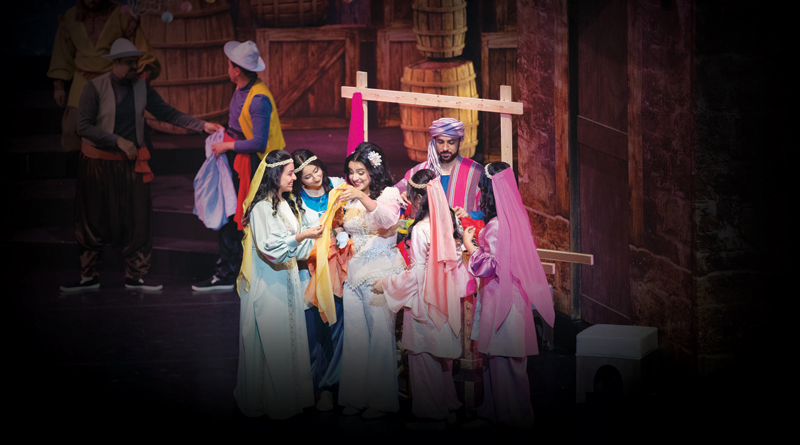

It was fitting that after the mourning period for HM Sultan Qaboos, the Royal Opera House Muscat reopened its doors on Saturday with the world premiere of, ‘Tarh el Bahr - The Sea Treasures’, set in a traditional coastal community. The contemporary Arab opera in two acts was composed by renowned Egyptian musician, Monir Elweseimy in collaboration with a formidable creative team from Egypt. The production by ROHM aimed at supporting new innovators from the Arab world to develop an operatic genre using colloquial Arabic, a traditional plot featuring good over evil, and a musical language accessible to Arab audiences in its simplicity.






The Elweseimy’s score to the music drama was performed from the pit by Muscat’s own Royal Oman Symphony Orchestra – rising admirably to the challenge of their first venture into opera – under the energetic, animated Maestro, Osama Ali Ahmed. The curtain rose with great promise to a haunting oboe melody (Nooh al Maharami) played over lush, tonal harmony from the ROSO strings. The love story was anticipated through a contemporary ‘pas-de-deux’ dance sequence during the overture which featured some interesting writing for brass and later, pentatonic melodies which suggested an oriental, Egyptian inflection.

The first scene was set in a fishing village against an impressive projection of a moon in a big sky designed by Videographer, Malak Amr Abdullah. A boat was tossed in a stormy sea as the women’s chorus performed a powerful opening number, praying for the safe return of their men. Costumes designed by Asmaa Abdul Shafi were authentic and colourful Arab garb, with the fishermen alighting safely from their perilous expedition.
The story was indeed a simple tale of jealousy, scheming and final resolution through true love. The young sea captain Ali was performed with youthful panache by twenty-five-year-old M. Shata Dor opposite Omnia Aboubakr as the beautiful Salma, daughter of the Sheikh of Merchants, though dressed in a less than flattering outfit.
The Sheikh was sung by lyrical bass, Mohamed Abdel-Qader with the help of a microphone in a register too low for his natural range. The effect was sadly an imbalance between miked soloist and un-miked chorus – a situation rarely witnessed at ROHM. Unusual instrumentation exploited the piano’s percussive timbre (Ahmed Adel Esmat) with mellow trombone lines (Saleh al Asmi, Awad al Amri), while an unsynchronised dance troupe distracted from an otherwise visually appealing presentation. There were twenty-three Omani extras, including children to augment the crowd scenes and involve local participation.
The show was directed by experienced singer and acclaimed stage director Abdallah Saad, though more rehearsal time would have resulted in a more professional, polished performance. It was a challenge to blend Western operatic forms and harmony with Arabic traditional melody, but there were moments of superb achievement. The first love scene between Ali and Salma using warm cello themes over rippling piano and harp accompaniment was delightfully moving.
The final scene moved to the seashore with suspended fishing nets, barrels and a huge full moon framed by two large gates as the chorus performed an impressive atonal bazaar sequence. A stunning projection of sunset on the Nile illuminated Salma’s first solo in an iconic Arabesque song genre, and later Ali’s tenor solo composed on an Arabic scale used exotic glockenspiel effects against strings, piano and some lovely themes in the woodwind. The dashing singer Walid Al Laithi performed the role of the devious Rami with exaggerated parody, along with his gangster buddies - veritable pirates in their shiny black pantaloons.
Act Two was theatrically tighter and moved the action along. Velvet drapes adorned the windows, revealing a blue dawn in the Sheikh’s house. The chorus of gangster-pirates stole jewels and dowry chests to incriminate the hapless Ali with pantomime jest. Salma, now in a becoming yellow gown, was surprised at Ali’s actions, the men’s chorus became police caricatures while the women’s chorus provided a lovely commentary on the scene.
Scene Two provided a dramatic highlight; another haunting oboe solo introduced Ali in the watery light shed through his prison bars. On a divided stage Salma performed her Arabesque solo over romantic orchestration, “No more roses, only thorns”, although much was lost in the translator’s attempts to rhyme in English. By contrast from Ali’s jail cell, Shata performed his moving plaint against the injustice meted out to him over some beautiful horn playing (Issa al Kulaibi, Mundhir al Lazaki), receiving heartfelt applause.
Soldiers marched on stage Carmen-like, while the police would have done any Gilbert & Sullivan Operetta proud, to a rousing military trumpet fanfare (Talal al Wahaibi and Yousef al Balushi). Ali and Salma were reunited in a jaunty syncopated number which melted into a lyrical love-duet. The Finale was only tainted by eight dancers front of stage performing out of sync (choreography by Monadel Anter Abolyazeid), as the chorus asked, ‘Where is the Treasure?’ to circus-like music featuring bells, brass and percussion. They responded, ‘Love is light, truth, good and innocence; love within them is the treasure they live with’, concluding the ambitious musical production on a positive, upbeat note.
PHOTOS BY KHALID AL BUSAIDI
Oman Observer is now on the WhatsApp channel. Click here



